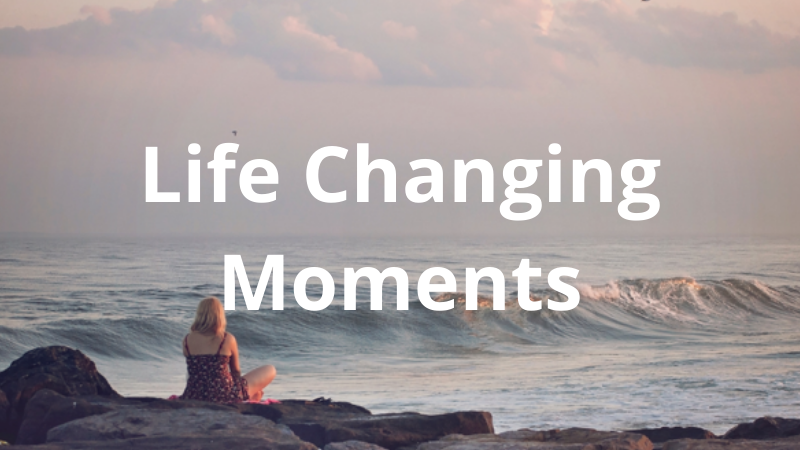Life Changing Moments
One of my own special moments occurred when I was consumed with grief after the death of my daughter. I was sitting on rocks at the beach, mesmerised by the sight and sound of waves, struggling to find hope that life would ever feel OK again. I was pulled out of my almost trance like state by a little voice saying “Excuse me, I just wanted to tell you how beautiful you look sitting there on the rocks.” I looked up to see a sweet little 7 year old boy who was re joining his smiling mother on the sand.
Everything changed in that moment. I noticed how perfect the day was – clear blue sky, sun sparkling on the water, and a warm feeling around the ice in my heart. That child will never know what he did for me. He gave me the gift of a precious moment, and I try to give its effect back to life.
For many of us, the course of our life begins to change in early childhood when we first hear and absorb the meaning of the phrase ‘just a moment’. Our parents or other caregivers may have previously noticed and attended to our every need without delay, allowing us to assume that we were the centre of the universe. As reality dawns in our young minds, our initial grief – the loss of the warm, safe cocoon of our mother’s womb – becomes more complex. The journey of life with all of its ups and downs, twists and turns, frustrations, disappointments, excitement, joy and sorrow has begun in earnest.
How we respond to this new experience will be determined by many things; the tone of the voice delivering those confronting words, our age, physical and emotional development, our sense of security, our individual personality, our family and social environment, and the way in which the words are followed up.
Some of us will cry, others will throw a tantrum, still others will keep tugging at unresponsive legs, and some will wait passively. I find myself wondering how many of us change those initial responses to frustration? How many of us learn how to adapt to delayed gratification? How many of us remain hurt or angry when our needs aren’t noticed? How many of us learn to read the signs that encourage us to wait for appropriate moments to ask to have our needs met?
How and when do we develop a mature understanding of the needs of others, of the demands on their time that necessitate prioritising tasks, including those involved in meeting our needs? How do we prevent ourselves from feeling rejected, from interpreting delays as signs that we are unworthy? Self centeredness seems to dwell fairly close to the surface for most of us, easily brought into foreground at times of stress, overtiredness, illness or grief.
No matter what our level of intellectual development or emotional maturity, I wonder how many of us as adults really understand what a moment in time means to a very young child? In fact, what do we really mean when we say ‘wait a moment’? Seconds, a minute or ten, an hour, or as long as we need? A minute can seem like an eternity, especially before we have grasped the concept of time.
By the time we reach adulthood, the word ‘moment’ is part of our everyday language, so familiar that we rarely stop to think about what a moment can mean, what it can accomplish, or what its long term impact might be, not only to small children, but to everyone.
Time means different things to all of us, the meaning changing as we age, and as we experience significant life events.
Painful Moments
 In a flash, an instant, a second, a small space in time, an event can occur that changes our lives forever. Moments of significance, gravity, force and power can darken the brightest day, break the strongest heart, extinguish hope, cloud our minds, make our bodies feel leaden, stimulate fear, reduce us all to the vulnerability of a small child. Moments can feel endless, unendurable, deeply painful, weigh heavily, diminish appetite, prevent sleep, change behaviour, paralyse. Moments can feel like an eternity.
In a flash, an instant, a second, a small space in time, an event can occur that changes our lives forever. Moments of significance, gravity, force and power can darken the brightest day, break the strongest heart, extinguish hope, cloud our minds, make our bodies feel leaden, stimulate fear, reduce us all to the vulnerability of a small child. Moments can feel endless, unendurable, deeply painful, weigh heavily, diminish appetite, prevent sleep, change behaviour, paralyse. Moments can feel like an eternity.
Think of the moments you have waited with bated breath for news of someone you love, or heard a diagnosis that filled you with fear. Think of the moment you learned of the death of someone you love, or were with them as they took their last breath; the moments you lost hope; the moments you felt overwhelmed by a challenge; the moments you have railed against the unfairness of life, or the ingratitude and selfishness of others; moments of loneliness and despair. These and many other moments can feel like an eternity.
The Impact of Positive Life Events
As I write, I am sensitive to the fact that some folk of all ages find it difficult to experience even a moment of joy. My compassionate hope is that they will find the life changing care that they desperately need, so that they too can experience the kind of moments I am writing about in this section.
Moments can have almost magical power. In the twinkling of an eye we can change someone’s mood and lighten the atmosphere in a room. A wink, a smile, a ‘thumbs up’, a look of appreciation, compassionate tears in our eyes, a hug, can all stimulate heart warming joy. Moments are precious.
Do you remember the feelings you experienced as a child when you opened a gift that fulfilled your hopes? The moment you received good news? Your first kiss? A proposal? A special achievement? The birth of children? The phone call that told you your job application was successful? Special moments of family or community celebration?
Most of us have experienced a zillion moments of joy which we can re-experience each time we remember, especially when we recount the memory to an interested other. It’s not possible or desirable for us to be happy all of the time, but we can all experience or create moments of happiness that permeate our being, and add to the well being of others.
Moments of Decision
We probably all have memories of spontaneous moments – moments when we have made quick decisions that have enabled us to change direction. Other decisions, perhaps those that involve responsibility for others, may have involved many moments of introspection and a few deep breaths. Not all life changing moments happen without help.
Some years ago I counselled numerous people who were unhappy in their current job or chosen profession. They longed for change, but were afraid to take a risk.
As I explored with them the cause of their discontent, it became obvious that their career path had unfolded as a result of what I call ‘parental messages’ – ‘the shoulds’.
During our growing up years, people (parents, relatives, teachers) note our academic successes, our personality traits, our aptitude for certain activities, our ability to perform, amuse or entertain, and as a result, tell us what they think we should be when we grow up.
They may also notice and comment on our inability to achieve tasks or milestones, or to live up to their expectations. Some children become the recipients of their parents’ projected hopes and unfulfilled dreams, and are rewarded with praise each time they seem to be heading in the right direction, that is, to please their parents or teachers.
Whatever the underlying reason, most of us will have heard the words ‘you should be a …when you grow up.’
If those ‘shoulds’ fit with our own hopes and desires, that kind of reinforcement will serve us well. If not, we may choose a career path that will eventually ‘run out of steam’. Those were the people who came to see me.
I am now going to invite you, the reader, to do the exercise I did with many of those people as we worked together to find a fulfilling occupation that enabled them to express who they truly were.
I hope you can spare a moment to sit somewhere warm and peaceful and think about your own childhood. Think back to the earliest time you experienced a moment of happiness – a moment that stimulated your senses – touch, taste, sound, smell, sight, or perhaps your intellect, with thoughts that excited you or gave you a feeling of fulfilment. This is what I call ‘awareness of the magic of childhood’.
Consciously or unconsciously we long to re-experience that feeling or vision. Ideally, we will choose a career path that allows those moments to re-occur with enough frequency to keep our emotional and intellectual ‘tanks’ full – we won’t ‘burn out’. Does your career choice do that for you? If not, this may be an important moment of decision.
If what I am saying is confusing, perhaps I should give a personal example to clarify what I mean. As a child I was given praise for writing or telling stories to entertain or comfort, and for listening compassionately to confidences shared with me about unhappiness friends or relatives were experiencing. Some of those ‘magical moments’ occurred when people much older than me trusted me with their stories, allowing me to feel part of their world, to see life through their eyes.
My teachers and careers advisor told me I should be a social worker or counsellor. The ‘shoulds’ kind of fitted, but I didn’t really know what social work or counselling was, while I did know and admire teachers and nurses. I had no idea how I was going to find the right combination, so briefly tried a few different occupations. I worked for a funeral director, a doctor, and in a public relations firm. Finally, I was given another ‘should’ with the necessary information and support to help me achieve what I was searching for.
I studied and became a counsellor, a role that also involved teaching. I wrote books and stories, and married a nurse who is also a teacher and counsellor. Those roles have enabled me to experience many wonderful moments of true connection with others and I can truthfully say that I have never felt ‘burnt out’ in my working life. Well, other than the times I have felt overwhelmed with tedious paper work.
Another example is that of a young man who was unhappy with his role as an accountant. His ‘magical memory moments’ were times spent with his grandmother while she baked, and taught him how to cook. He loved the smells, the feel of pastry, the laughter and love he shared with his grandmother, and the praise he received when he made something special. He was eventually able to take a risk and decided to train as a chef. The last time I heard from him he told me he couldn’t wait to go to work each day.
Providing Life Changing Moments for Others
 Most of us lead busy lives, and use busyness or tiredness as an excuse for not contributing to positive life changes for others.
Most of us lead busy lives, and use busyness or tiredness as an excuse for not contributing to positive life changes for others.
We need to remind ourselves that it only takes a moment to express love, to show compassion, to ease suffering, to end loneliness, to apologise, to take someone’s hand, to offer words of praise or encouragement, to give a compliment, to reach out with our eyes, hands, hearts and minds – to experience the all encompassing joy of undefended, total connection with another. Moments of true connection may be all that it takes to change the course of our own lives and the lives of others.
Think now of a special moment when you felt truly understood, loved, needed, appreciated, safe – and remember the physical, emotional and spiritual effect of that brief period in time. Those moments suffuse our whole being with warmth.
Take a moment to reflect on all the moments in your life when you have used their power to create a special connection with someone you love, or positively affect the life of a stranger. Remember always, the power of a single moment in time.
Moments are precious, and can be invaluable. Even the busiest person can use the power of a single moment to create magic, to energise hope, to change the life of another.
Memorable Moments
 We probably all have memories of spontaneous moments, moments of passion, moments when we have changed direction, and times when we have surrendered to the moment. We may remember the moments when we chose to ‘bite our tongue’ and withhold criticism; the moments when we chose to give truthful praise to someone we dislike or envy. Moments when we chose to do what felt right and were later glad we had done so.
We probably all have memories of spontaneous moments, moments of passion, moments when we have changed direction, and times when we have surrendered to the moment. We may remember the moments when we chose to ‘bite our tongue’ and withhold criticism; the moments when we chose to give truthful praise to someone we dislike or envy. Moments when we chose to do what felt right and were later glad we had done so.
It only takes a moment for any of our senses to respond – sight, sound, touch taste, and smell can all be stimulated or soothed in a second or two. Minds can be soothed or stimulated in a moment, with very few words, said by the right person at the right time.
We can create new life in a moment, and we can re-live with pleasure all the special moments of our lives.
The world is full of people who are hurting.
Every moment of every day someone is receiving a painful diagnosis, grieving the death of someone they love, yearning for a missing person, experiencing unbearable pain, feeling depressed, angry or worthless. Many are homeless, dispossessed, living in poverty, filled with fear, abandoned, abused, lonely or neglected – devoid of hope.
In the face of tragedy we all feel helpless – an empathic response. We need to take a deep breath and remind ourselves that we have the power to convert our feelings of helplessness to moments of change. It only takes a moment to care.
Help
Help is always available – at ‘A Friend’s Place’ or by contacting our outreach service.
Dianne McKissock OAM
NCCG Outreach Support Service
Email support for dying and bereaved people and anyone involved in their care






